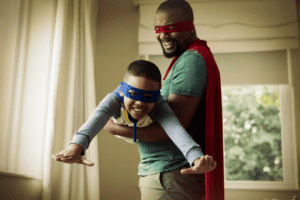Last Wednesday my daughter saw herself in the mirror. We watched the presidential inauguration together and she saw herself reflected everywhere we looked.
There was Captain Andrea Hall, the hearing daughter of a Deaf parent, reciting the Pledge of Allegiance in ASL, my daughter’s primary language.
Amanda Gorman, a young woman whose skin color and hair reflects my daughter’s, took the national stage and blew us all away (see what I did there?) as the youngest poet laureate in history.
Kamala Harris became Vice President and my daughter, along with girls and women everywhere, watched a woman step into that role for the first time, watched a woman of color step into that role for the first time. Later, one of her sorority sisters described what that moment meant to her, saying “[We] see us reflected back to us, not just in her brownness, but her fierceness.”
This is powerful stuff.
Kids with disabilities – like everyone else – need to see people who look like us so we understand what they are capable of.
As parents, we are usually our children’s first mirrors. They watch and mimic how we regulate ourselves when we get upset. They watch the ways that we take care of (or don’t take care of) our own mental health and they take on many of our habits.
But if you and your child don’t share the same disability, you may need to go out of your way to make sure your child has people in her life who can help her dream about who she may become.
Sometimes these mirrors are people doing incredible things, like becoming world-famous physicists or reciting their poetry for an audience of millions despite a speech impediment or winning a gold medal at the Paralympic Games.
Sometimes these mirrors are people doing much less glamorous things that are no less important: putting our hair into a ponytail with one hand. Making a podcast. Floating in the ocean.
It all matters. So how do we make sure our kids have these mirrors?
-
Immerse yourself in the culture. Learn the language people use and try to see the world as they do. This will help you understand your child’s experiences. What is it like to see the world through their eyes? What stumbling blocks do they hit that you might not have noticed? What are the best things about their disability? These things might surprise you, and it’s such a delight to learn about them, even the challenges, because each thing you learn brings you a little closer to your child and helps your child feel just that much more understood.
When my dad started using a wheelchair, I suddenly started to notice every heavy door, broken elevator, and tightly packed restaurant. I noticed that when we went to the doctor’s office, the receptionist spoke to me instead of him, and so I learned to hang back so no one could even think that he wouldn’t speak for himself. The whole world looked different to me. This didn’t mean I knew what it was like to use a chair instead of my legs, but it helped me better understand what the world looked like to him. I could hear his joys and frustrations in important new ways.
-
Meet the experts: the adults (and other children) who share these disabilities. If you don’t already have these experts in your life, it’s time to put yourself out there. Look for a local community organization that supports people with this disability. Call a local special education school and ask if they have a community outreach person you and your child could talk to. Ask around in your local facebook parent groups, your town’s disability commission, or your congregation. Build relationships and, if it’s appropriate, encourage your child to do the same.
When it came to my dad, I asked other wheelchair users about their experiences, what was helpful and what made things harder. What they shared helped me to understand more of my dad’s needs without him having to explain it all to me. As a parent, this understanding will allow you to advocate for your child and, just as important, help your child learn how to advocate for themself.
-
Look to the media. Fictional characters and celebrities don’t replace real relationships, but they are powerful and they are becoming easier to find. Look for characters played or written by actors with those disabilities for the best representation. And social media… well, if your children are of a certain age I don’t need to tell you how much social media matters to them.
Try a few of these resources:
Books with characters who have mental illness,
Young adult books with main characters with disabilities,
Kids’ books that center characters with disabilities (but not their disability)
Kid-friendly movies with characters with disabilities
As the inauguration ended, I asked my daughter what she thought about all that we had seen. She shrugged her shoulders. “It was cool. I just can’t believe this is the first time a woman has been VP. Girls run the world!”
She knows.




